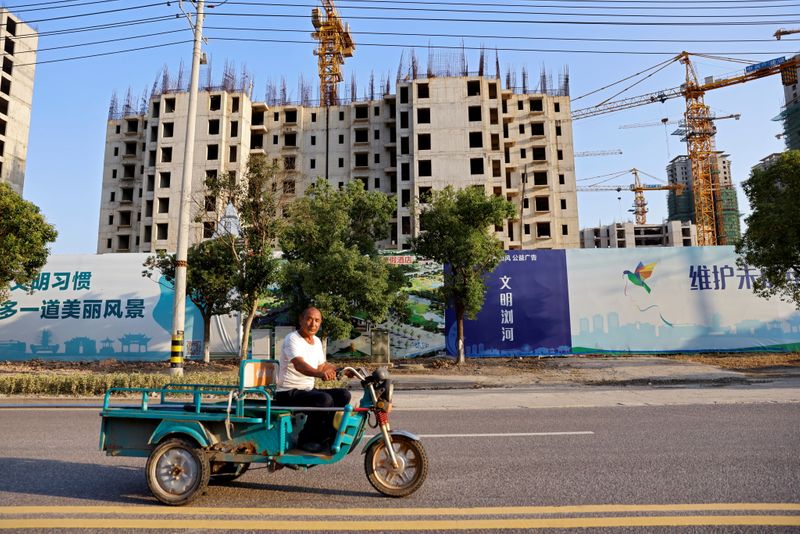Analysis-For Xi and China Evergrande, a delicate balancing act By

© Reuters. FILE PHOTO: A man rides a vehicle past the construction site of Evergrande Cultural Tourism City, a project developed by China Evergrande Group, in Suzhou’s Taicang, Jiangsu province, China September 23, 2021. REUTERS/Aly Song/File Photo
2/2
By Andrew Galbraith
SHANGHAI (Reuters) – The crisis at property giant China Evergrande Group poses a $305 billion conundrum for President Xi Jinping: how to impose financial discipline without fuelling social unrest.
With one year before the Chinese president is poised to secure an unprecedented third five-year term, the stakes are high during what is proving to be the most consequential period of his tenure.
Evergrande’s borrow-to-build model was enabled by a government reliant on property sales for revenue and unwilling to bite the bullet on runaway indebtedness for fear a collapse in prices would have devastating consequences for a country in which property accounts for 40% of household wealth.
Xi, who has unleashed a spate of industry and societal reforms this year in the name of “common prosperity”, has made clear that the excesses of decades of breakneck growth powered by a relentless rise in property prices and debt must be brought to heel.
But shared responsibility for Evergrande’s crisis – and worries about the repercussions of a messy collapse – complicate decisions on the fate of a conglomerate with $305 billion in debt that is scrambling to pay creditors, including bondholders owed $83 million in a coupon payment https://www.reuters.com/world/china/china-evergrande-bondholders-limbo-over-debt-resolution-2021-09-24 that was due on Thursday.
“The government has to some degree caused the problems at Evergrande,” said Andrew Collier, managing director at Orient Capital Research, citing debt ratio caps, known as the “three red lines”, placed on developers in 2020 that put Evergrande under significant stress and forced it to start to sell assets.
Those caps followed renewed official concern last year over property sector froth after monetary easing to cushion the impact of COVID-19 drove surging sales and signs of speculative overbuilding by developers.
But clamping down on property prices is difficult given the fiscal dependence on the sector. Local governments, which Orient Capital estimates account for 89% of total government spending, derived more than 40% of revenues from land sales in 2020, driving a codependent relationship with developers.
“(Developers) seem to get caught up in the political economy … which effectively leads to a tremendous number of bad decisions because you’re now making investments based on political whim and political winds, rather than actual sound business sense,” said Fraser Howie, author of several books about China’s financial system.
DEEP ROOTS
The roots of the crisis date to tax reforms in 1994, which bolstered central government coffers but left local governments reliant on land financing for revenue, said Alfred Wu, associate professor at…
Read More: Analysis-For Xi and China Evergrande, a delicate balancing act By
